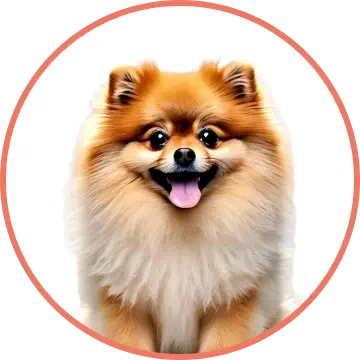ABOUT Shih Tzu
Shih Tzus, originating from ancient Tibet and bred as companion dogs for Chinese royalty, are known for their charming, affectionate nature and distinctive appearance. They are generally loyal and loving with their families but can be moody and unpredictable with unfamiliar people. This behavior often stems from their strong territorial instincts and need for socialization. Proper early training and exposure to different environments can help manage their reactions to new people.
Male
Ideal height: 23 - 27cm Ideal weight: 4 - 7kg

Female
Ideal height: 23 - 27cm Ideal weight: 4 - 7kg
Size
Medium
Life Span
Coat
Color
Medium
Traits & Characteristics
60%
80%
20%
60%
60%

Heat Tolerance
upto 24° C

Cold Tolerance
Upto -7° C

Best Diet for Shih Tzu


Carbohydrates
30 – 50%
Protein
20 – 30%
Fats
8 – 16%
Essentials, Vitamins & Minerals
6 – 8%
Fiber
2 – 4%
Total Kcal
1,000 – 1,500
Must have meal for a Shih Tzu
For a Shih Tzu, a balanced meal typically consists of high-quality protein sources, such as chicken or fish, with healthy fats and carbohydrates. Meals should include vegetables like carrots or peas and whole grains like brown rice. Ensure the diet has appropriate vitamins and minerals for overall health. Shih Tzus generally require around 30-40 calories per pound of body weight daily.
🍲 Try Our Shih Tzu Fresh Food!
Wholesome, freshly cooked meals designed for your Shih Tzu’s sensitive stomach, shiny coat, and overall health.
Book a Shih Tzu Diet Consultation
Get personalized diet advice for your Shih Tzu absolutely FREE. Our experts will guide you on portion sizes, nutrient balance, and food choices to keep your little companion healthy and thriving.

Shih Tzu Diet
Shih Tzus need a balanced diet that supports their small size, sensitive stomach, luxurious coat, and high energy. Fresh meals are the best choice for Shih Tzus, as they provide natural, nutrient-rich food that boosts immunity, keeps their coat shiny, and supports healthy bones and digestion. Since Shih Tzus can be picky eaters and prone to stomach issues, easily digestible, portion-controlled meals are key to keeping them active and happy.

Protein Based Diet
Shih Tzus thrive on a protein-rich diet that helps keep their coat silky, skin healthy, and muscles strong. Vegetables like pumpkin, carrots, beans, and spinach provide essential fiber and vitamins, while chicken, eggs, paneer, and fish supply high-quality protein and omega-3 fatty acids.
Simple meals like chicken with rice and carrots, or paneer with spinach and quinoa, support their energy needs while being gentle on their stomach. A touch of olive oil or fish oil promotes joint health and maintains their signature glossy coat.
❌ Avoid harmful foods: onion, garlic, grapes, raisins, avocado, chocolate, excess salt, and oily/fried foods.
WEIGHT, STRENGTH AND GUT CONSIDERATE DIET
Shih Tzus are prone to digestive sensitivities and weight gain, so a portion-controlled, fiber-rich diet is essential. Foods like pumpkin, beans, and carrots aid digestion, while lean proteins such as chicken, turkey, and fish help maintain muscle strength.
Adding probiotics like curd or yogurt helps balance gut health, and omega-3 fatty acids from fish oil reduce inflammation while supporting their skin and coat.
Consider Their Age
Like humans, a Shih Tzu’s diet should change as they grow:
🐾 Puppies (3–12 months): Need calorie-dense, protein-rich meals to support fast growth, strong bones, and immunity.
🐾 Adults (1–7 years): Require balanced meals with lean protein, fiber, and healthy fats to maintain energy and a shiny coat.
🐾 Seniors (7+ years): Benefit from lighter, easily digestible meals with joint-support nutrients like glucosamine and antioxidants to slow aging.

Apple
Provide fiber and vitamins; ensure seeds and core are removed.

Carrot
Crunchy and rich in vitamins; supports dental health and is low in calories.
Green Beans
Low in calories and high in fiber, aiding digestion and keeping them full.

Sweet Potato
Nutrient-dense with fiber, helping digestion and providing essential vitamins.
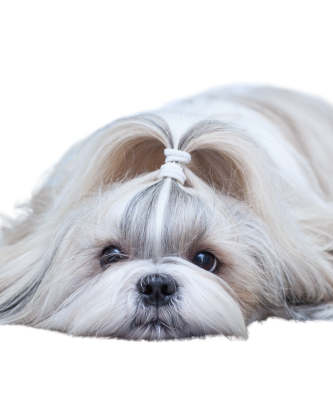
Training Needs for Shih Tzus
Shih Tzus are affectionate, intelligent, and eager to bond with their families. While they are quick learners, their playful and sometimes stubborn nature can make training a bit challenging if not approached with patience.
With positive reinforcement, consistency, and gentle guidance, Shih Tzus can quickly learn commands and house manners. Early socialization is key to reducing behaviors like barking, chewing, or separation anxiety.
Because Shih Tzus are small but active, they thrive on short walks, indoor play, and puzzle toys that provide both mental and physical stimulation. Proper training not only keeps them well-mannered but also strengthens their bond with their family.

Puppy Stage (2–6 months)
Shih Tzu puppies are adorable, playful, and affectionate, but they can be quite stubborn when it comes to toilet training. Early guidance should focus mainly on housebreaking, crate routines, and building basic manners indoors. Teaching them where to relieve themselves and setting boundaries around chewing, barking, and jumping is important from the start. Because Shih Tzus are companion dogs, early socialization with people and gentle exposure to sounds and environments helps prevent separation anxiety and clinginess later.
Suggested Package: 8 Sessions

Adolescent Stage (6–18 months)
During adolescence, Shih Tzus often test patience with their independent streak, and toilet training may need reinforcement. This stage is ideal for combining house training with obedience work. Commands such as Sit, Stay, Come, and Down should be practiced consistently, as Shih Tzus tend to become willful if they sense inconsistency. Training also focuses on reducing excessive barking, teaching calm greetings, and managing behaviors like stubborn refusal to walk or overdependence on attention. With structured guidance, your Shih Tzu learns to balance affection with discipline, making them easier to manage as they mature.
Suggested Package: 12 Sessions

Adult Stage (1.5 years +)
An adult Shih Tzu thrives on companionship and routine but needs refined training to stay well-mannered. The perfect 16-session plan covers everything — toilet habits, house manners, obedience, and importantly, leash walking. Although Shih Tzus are small, leash training is crucial to prevent pulling, stubborn halts, or fear-based behaviors during walks. Advanced obedience, recall, and polite social manners with children, guests, and other pets are reinforced. Mental stimulation through short trick training and interactive games helps keep them sharp and prevents boredom-related mischief. With proper training, an adult Shih Tzu becomes a loving, calm, and delightful companion both indoors and outdoors.
Suggested Package: 16 Sessions
Dog Training: Expert Guidance at Home
Turn your pup into a well-mannered pro—where training meets success

Vet Visits

Puppyhood (0-1 Year):

Every 3-4 weeks until 16 weeks, then every 6-12 months.

Vaccinations, parasite control, neutering, and behavior guidance.
Adulthood (1-6 Years):

Annual check-ups.

Vaccine boosters, dental care, diet, exercising, weight management.

Mature adulthood (7-9 Years):

Annual or bi-annual visits.

Senior screenings, joint health, vision and hearing checks, and diet adjustments.
Senior years (10+ Years):

Bi-annual visits or more.

Comprehensive exams, pain management, cancer screening, quality of life, and senior nutrition.
Vaccination Schedule

First
6-8 week
Second
10-12 week
Third
14-16 week
Regular
Yearly once
Grooming
Shih Tzus have a long, luxurious coat that requires regular grooming to prevent tangling and matting. They should be groomed every 2-3 weeks in the summer to manage shedding and keep their coat cool. In the winter, grooming can be done every 4-6 weeks to maintain their coat without over-stripping natural oils. Regular brushing between grooming sessions is also essential to keep their coa healthy.
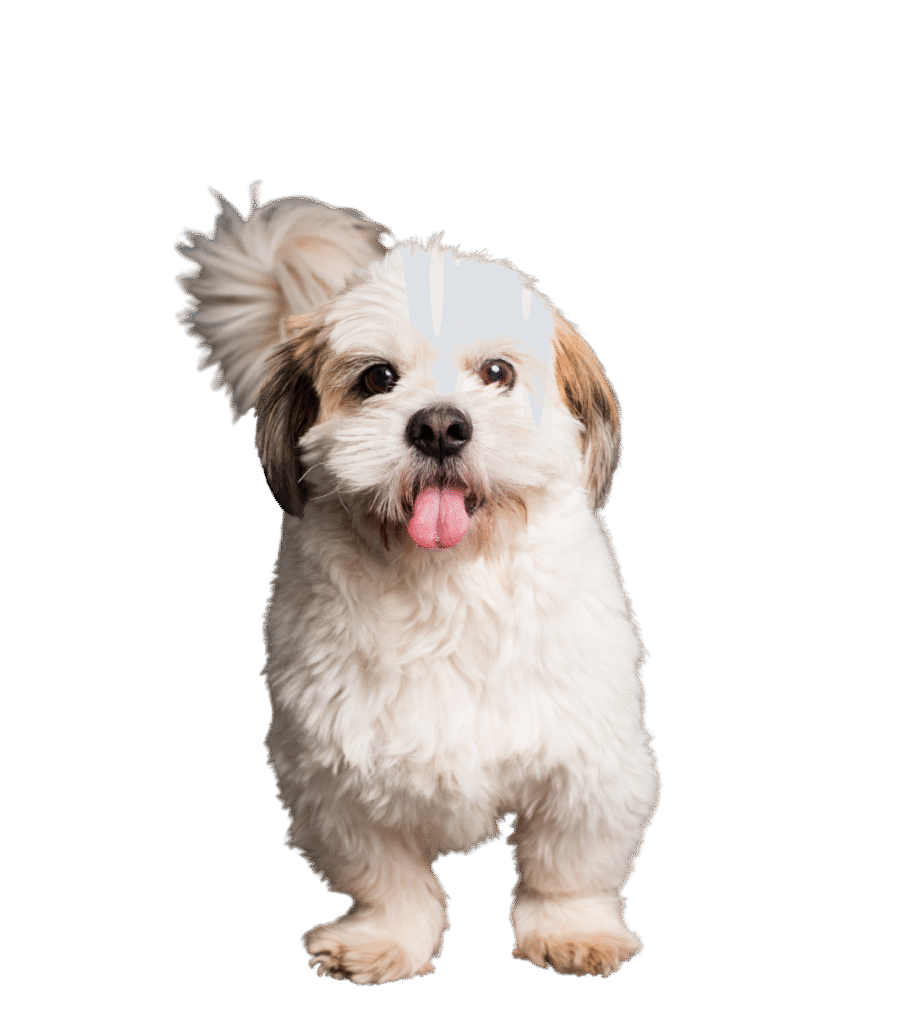
Brush & Bath guide
Brush your Shih Tzu’s coat daily at least once to prevent tangles and mats, and bathe them every 3-4 weeks to keep their fur clean and healthy. Regular brushing and bathing help maintain their coat and overall hygiene.

Ear Cleaning
Clean your Shih Tzu’s ears weekly to prevent infections and buildup. Use a vet-approved ear cleaner and ensure the ears are dry after cleaning to maintain ear health.
Nail clipping & Paw care
Trim your Shih Tzu’s nails every 3-4 weeks to prevent overgrowth and discomfort. Regularly check their paws for debris or signs of injury and keep them clean and dry. Ensure the nail beds are free of infections and consult a vet if you notice any issues.
Period Care
During her period, use doggy diapers, provide comfort, and monitor her health. Keep her calm with extra attention and gentle care to ensure she feels secure.
Dental Care
Brush your Shih Tzu’s teeth 2-3 times a week to prevent plaque buildup and dental issues. Regular dental check-ups are essential to ensure healthy gums and teeth. Dental treats and chews can also help maintain oral hygiene.

Give Your Shih Tzua Spa Day at Home!
👉 Regular grooming not only keeps shedding under control but also prevents skin infections and keeps your pup comfortable year-round.
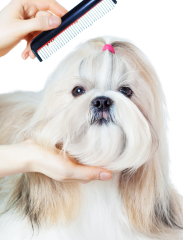

Health Conditions for Shih Tzu

Eye Problems
Shih Tzus are prone to eye issues due to their prominent eyes and facial structure.
Symptoms:
Redness, squinting, tearing, or discharge.
How to avoid:
Regular eye checks, keeping eyes clean, and protecting from debris.
Skin Allergies
Skin allergies are common due to their sensitive skin and long coat.
Symptoms:
Itching, redness, and rashes.
How to avoid:
Regular grooming, hypoallergenic shampoos, and avoiding known allergens.
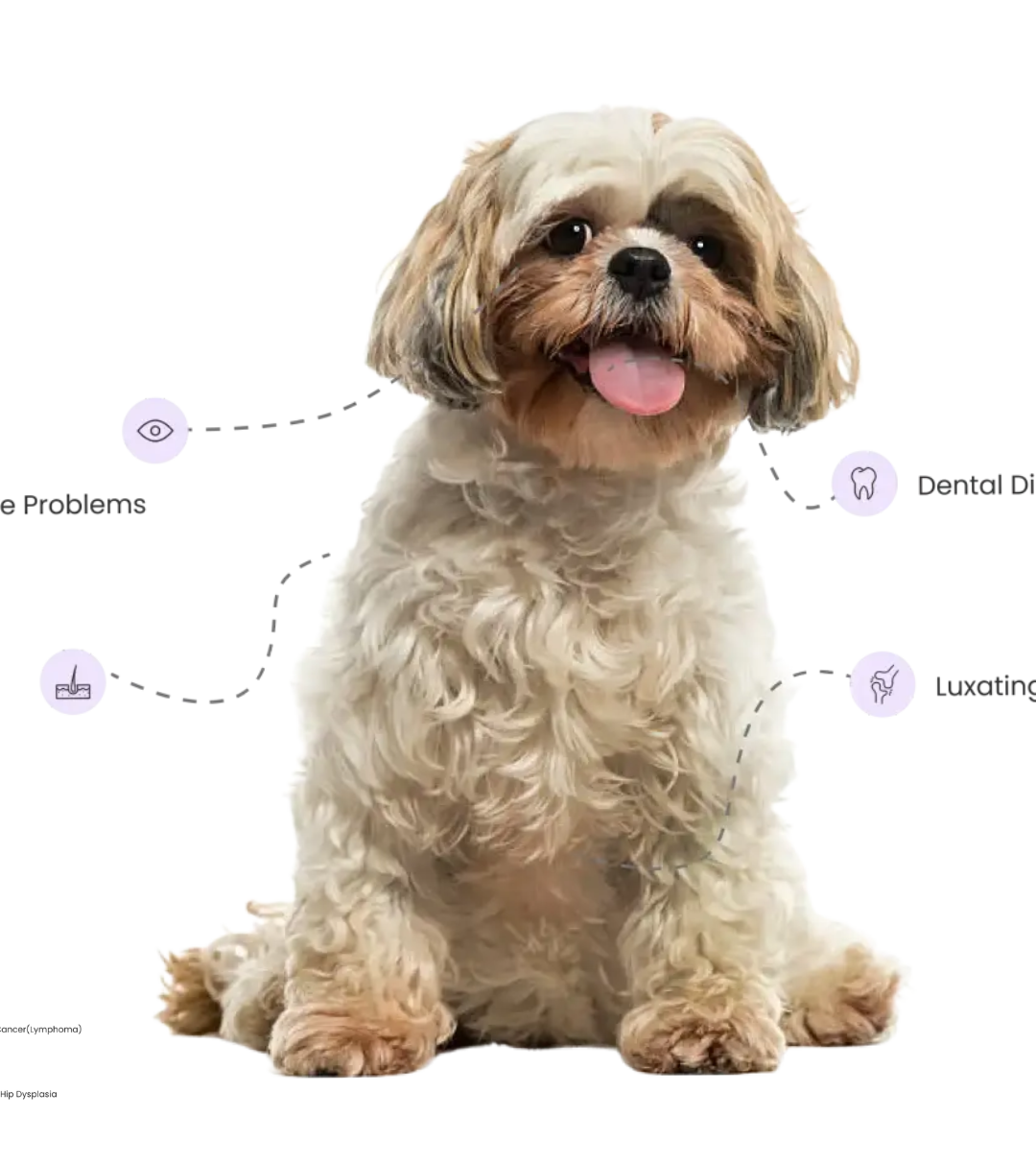
Dental Disease
Dental issues can arise due to their small mouths and dental alignment.
Symptoms:
Bad breath, gum inflammation, and difficulty eating.
How to avoid:
Regular brushing, dental chews, and professional cleanings.
Luxating Patella
This is a condition where the kneecap slips out of place, causing pain and lameness.
Symptoms:
Limping, skipping, or avoiding weight-bearing on the affected leg.
How to avoid:
Avoid excessive jumping and sudden changes in direction.
Frequently Asked Questions

Shih Tzus are ideal if you want a small, affectionate, and playful companion. They make excellent family pets, apartment dogs, and travel companions. This breed thrives with daily exercise, mental stimulation, and grooming. They are best suited for owners who can commit to regular brushing, socialization, and training. With proper care, Shih Tzus are loving, loyal, and highly rewarding pets.
Shih Tzu puppies are gentle, social, and curious. Early socialization, structured routines, and toilet training are essential to raise a confident, well-behaved adult dog. Introduce them to new people, pets, and environments to prevent fearfulness or stubbornness later.
Take your puppy outside after meals, naps, and play. Reward immediately when they go in the correct spot. Follow this 90-day toilet training schedule:
Week 1–2: Take outside every 1–2 hours. Praise and reward.
Week 3–6: Gradually extend intervals to 2–3 hours, maintain consistency.
Week 7–12: Encourage longer outdoor intervals and introduce commands like “Go potty.” Supervise indoors to prevent accidents.
Shih Tzus are small but energetic. They need 20–30 minutes of daily exercise, ideally split into 1–2 short walks per day, combined with indoor play to prevent boredom and maintain fitness.
Feed a high-quality small-breed puppy diet with high protein and moderate carbs for healthy growth and dental care. Include nutrients like omega-3 fatty acids, calcium, and vitamins. Adult Shih Tzus need balanced meals with controlled portions to avoid obesity and maintain healthy teeth.
Brushing: Daily to prevent mats and tangles in their long, silky coat.
Bathing: Every 3–4 weeks with mild shampoo.
Trimming: Every 6–8 weeks, especially around paws, face, and sanitary areas.
Nail care: Trim every 3–4 weeks.
Regular grooming keeps the coat healthy, clean, and beautiful while controlling shedding.
Start training from 8–9 weeks using positive reinforcement. Teach commands like sit, stay, come, and leash walking. Early training prevents stubbornness, excessive barking, and fearfulness.
Schedule regular vet visits, vaccinations, and deworming. Feed a balanced diet, maintain dental hygiene, and provide gentle exercise. Watch for breed-specific issues like eye problems, dental issues, and breathing difficulties. Preventive care ensures a long and healthy life.
Shih Tzus enjoy mentally and physically stimulating activities: short walks, puzzle toys, fetch, and indoor play. These activities keep them happy, active, and prevent boredom-related behavior.
Daily brushing prevents mats and tangles. Use a de-shedding tool if needed. A nutritious diet with omega-3s supports healthy skin and coat. Avoid shaving the coat—it protects their skin and helps regulate body temperature.







